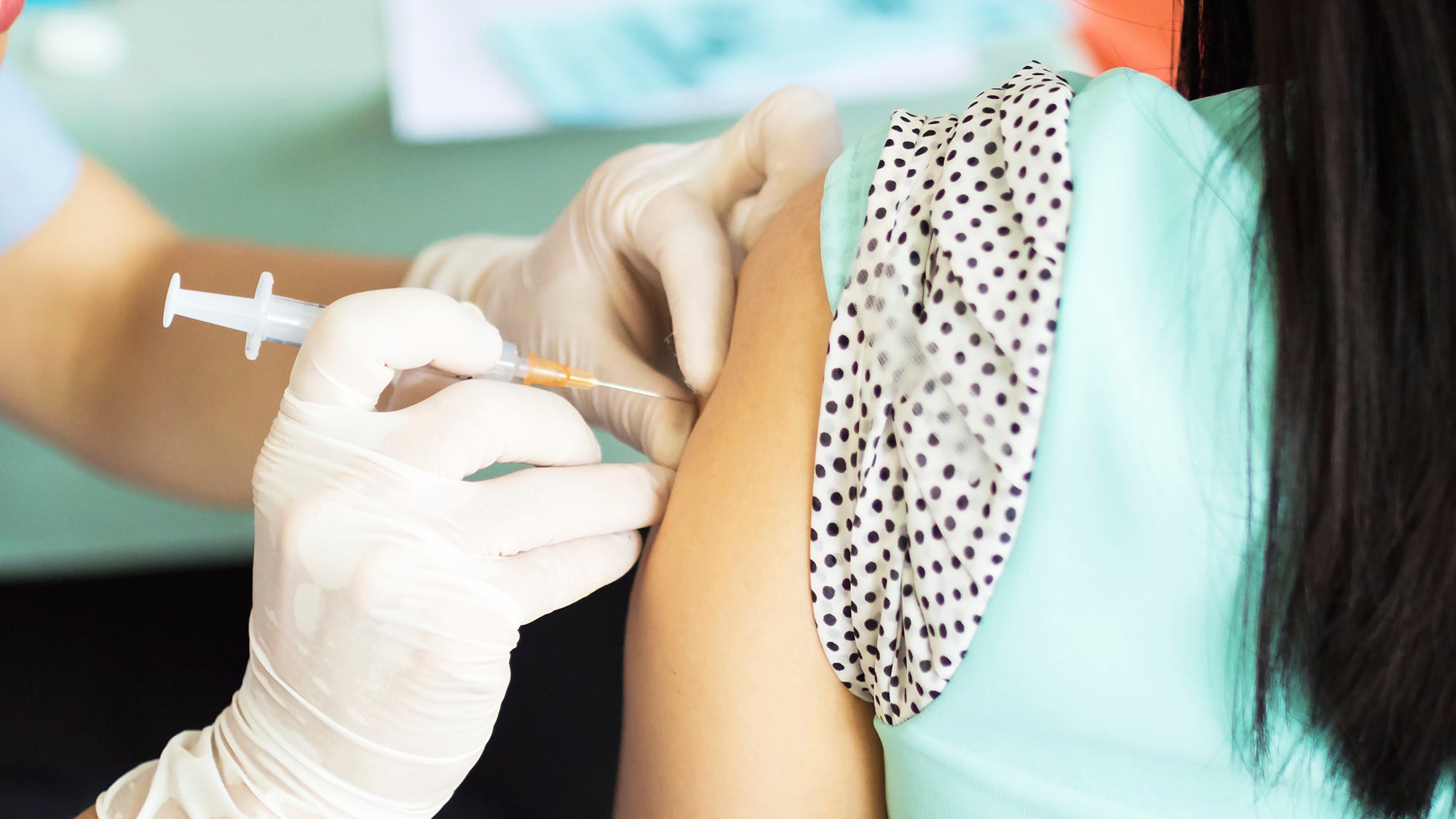Poll: Amid multi-state measles outbreak, 79% of Americans support routine childhood vaccine requirements

Among the 21% who don’t support requirements, reasons focus on parental choice more than safety concerns
For immediate release: June 25, 2025
Boston, MA—In the midst of a multi-state measles outbreak, a new poll by Harvard T.H. Chan School of Public Health and the de Beaumont Foundation finds that most U.S. adults (79%) say parents should be required to have children vaccinated against preventable diseases like measles, mumps, and rubella to attend school. This includes a majority of adults across party lines—90% among Democrats and 68% among Republicans—as well as 66% of those who support the “Make America Great Again” (MAGA) movement. It also includes 72% of all parents. Among all U.S. adults, about one in five (21%) do not support routine childhood vaccine requirements.
The poll was conducted from March 10 to March 31, 2025, among a probability-based, nationally representative sample of 2,509 U.S. adults age 18 and older. At the time the poll was conducted, the measles outbreak was in its third month and had spread to multiple states. The poll was supported by the Robert Wood Johnson Foundation and the de Beaumont Foundation.
“Childhood vaccine requirements are less controversial than many people may think,” said Brian Castrucci, president and CEO of the de Beaumont Foundation. “This poll shows that they’re widely supported across political groups—and it’s heartening to see that so many Americans understand the importance of vaccination, which remains a fundamental pillar of public health and disease prevention.”
The most common reason for opposing vaccine requirements is parental choice, not concern about safety.
- Among the 21% of adults who say they don’t support vaccine requirements, most (79%) say a major reason is that they think it should be the parents’ choice whether to vaccinate their child.
- Smaller majorities of those who don’t support requirements say they think government agencies who enforce vaccine requirements are influenced too much by politics and big companies (66%), worry that children might be required to get too many vaccines in the future (64%), and think vaccine requirements exist to make money for companies who develop vaccines (54%).
- Concern about vaccine safety is a less common reason, cited as a major reason by 40% of those who do not support routine childhood vaccine requirements.
Major reasons for supporting vaccine requirements include vaccine effectiveness, family responsibilities to keep schools healthy, and concern that diseases like measles could return without vaccine requirements.
- Among the 79% who support routine childhood vaccine requirements, the vast majority cite vaccine effectiveness (90%) and family responsibilities to keep schools safe (87%) as major reasons.
- Those who support requirements also commonly say that major reasons are that they think diseases like measles will come back if vaccines are no longer required (84%), vaccine requirements are important to protect children who cannot get vaccinated for medical reasons (81%), and routine vaccines have been proven safe because they are well-tested (80%) and have been around so long (76%).
- Fewer of those who support requirements say trust in government agencies that approve routine childhood vaccines is a major reason for their support (49%).
“At this point, public opposition to childhood vaccine policies is often more about parental rights than vaccine safety,” said survey lead Gillian SteelFisher, director of the Harvard Opinion Research Program and principal research scientist at Harvard Chan School. “As the country leans on vaccine policies to help address its largest measles outbreak in decades, public health leaders need to be prepared to bring empathy to conversations that go beyond just trying to convince people vaccines are safe.”
The vast majority of parents and adults across political parties believe routine childhood vaccines are safe.
The poll found that 91% of the public believes that vaccines for childhood preventable diseases are safe for most children. This includes 63% who believe vaccines are very safe and 28% who believe they are somewhat safe. Only 5% and 4% believe they are not very safe or not at all safe, respectively.
Belief in vaccine safety is high among parents (88%) and across political affiliations:
- Democrats: 97%
- Republicans: 88%
- Supporters of the MAGA movement: 84%
That said, Republicans and MAGA supporters are less likely to believe vaccines are “very safe” (51% and 47%, respectively) than Democrats (80%).
Topline findings are available at https://hsph.harvard.edu/research/opinion-research/de-beaumont-foundation-harvard-polls/.
Methodology
Results are based on survey research conducted by the Harvard Opinion Research Program (HORP) based at Harvard T.H. Chan School of Public Health, in partnership with the de Beaumont Foundation. The research was supported by the Robert Wood Johnson Foundation (RWJF) and the de Beaumont Foundation. Representatives from these organizations developed the survey questionnaire, while analyses were conducted by researchers from Harvard Chan School and the fielding team at SSRS of Glen Mills, Pennsylvania.
The HORP project team included Gillian SteelFisher, director of HORP and principal research scientist at Harvard Chan School, and Mary Findling, managing director of HORP.
The de Beaumont Foundation project team included Brian Castrucci, president and CEO of the de Beaumont Foundation, Emma Prus, senior program and research associate, Mark Miller, vice president of communications, and Nalini Padmanabhan, communications director.
The poll was conducted among a probability-based, nationally representative sample of 2,509 U.S. adults ages 18 and older. At the time the poll was conducted, the measles outbreak was in its third month and had spread to multiple states. Interviews were conducted in English and Spanish online and by telephone. Respondents were reached online and by phone through the SSRS Opinion Panel, a nationally representative, probability-based panel. Panelists were randomly recruited via an Address Based Sampling frame and from random-digit dial samples on SSRS surveys. Most panelists completed the survey online with a small subset who do not access the internet completing by phone. The interview period was March 10 to 31, 2025.
Findings and conclusions are those of the authors and do not necessarily represent the official position of the de Beaumont Foundation, RWJF, or Harvard Chan School. When interpreting findings, one should recognize that all surveys are subject to sampling error. Results may differ from what would be obtained if the whole U.S. adult population had been interviewed. The margins of error at the 95% confidence interval are +/-2.3 percentage points for the total sample (n=2509), +/-3.6 for Republicans, including adults who lean Republican (n=1016), +/-3.4 for Democrats, including adults who lean Democrat (n=1132), +/-4.2 for MAGA supporters (n=778), and +/-3.9 for parents or guardians of children under 18 years old (n=777). Possible sources of non-sampling error include non-response bias, as well as question wording and ordering effects. Non-response in web and telephone surveys produces some known biases in survey-derived estimates because participation tends to vary for different subgroups of the population. To compensate for these known biases and for variations in the probability of selection within and across households, sample data are weighted in a multi-step process by probability of selection and recruitment, response rates by survey type, and demographic variables (gender, age, education, race/ethnicity, region, the frequency of internet use, civic engagement, population density, registered voter, party ID, religious affiliation, number of adults in household, and home tenure) to reflect the true population of adults in the U.S. Other techniques, including random sampling, multiple contact attempts, replicate subsamples, and systematic respondent selection within households, are used to ensure that the sample is representative.
Visit the Harvard Chan School website for the latest news and events from our Studio.
For more information:
Maya Brownstein
mbrownstein@hsph.harvard.edu
Nalini Padmanabhan
media@debeaumont.org
###
Harvard T.H. Chan School of Public Health is a community of innovative scientists, practitioners, educators, and students dedicated to improving health and advancing equity so all people can thrive. We research the many factors influencing health and collaborate widely to translate those insights into policies, programs, and practices that prevent disease and promote well-being for people around the world. We also educate thousands of public health leaders a year through our degree programs, postdoctoral training, fellowships, and continuing education courses. Founded in 1913 as America’s first professional training program in public health, the School continues to have an extraordinary impact in fields ranging from infectious disease to environmental justice to health systems and beyond.
The de Beaumont Foundation creates and invests in bold solutions that improve the health of communities across the country. Its mission is to advance policy, build partnerships, and strengthen public health to create communities where everyone can achieve their best possible health. For more information, visit www.debeaumont.org.


